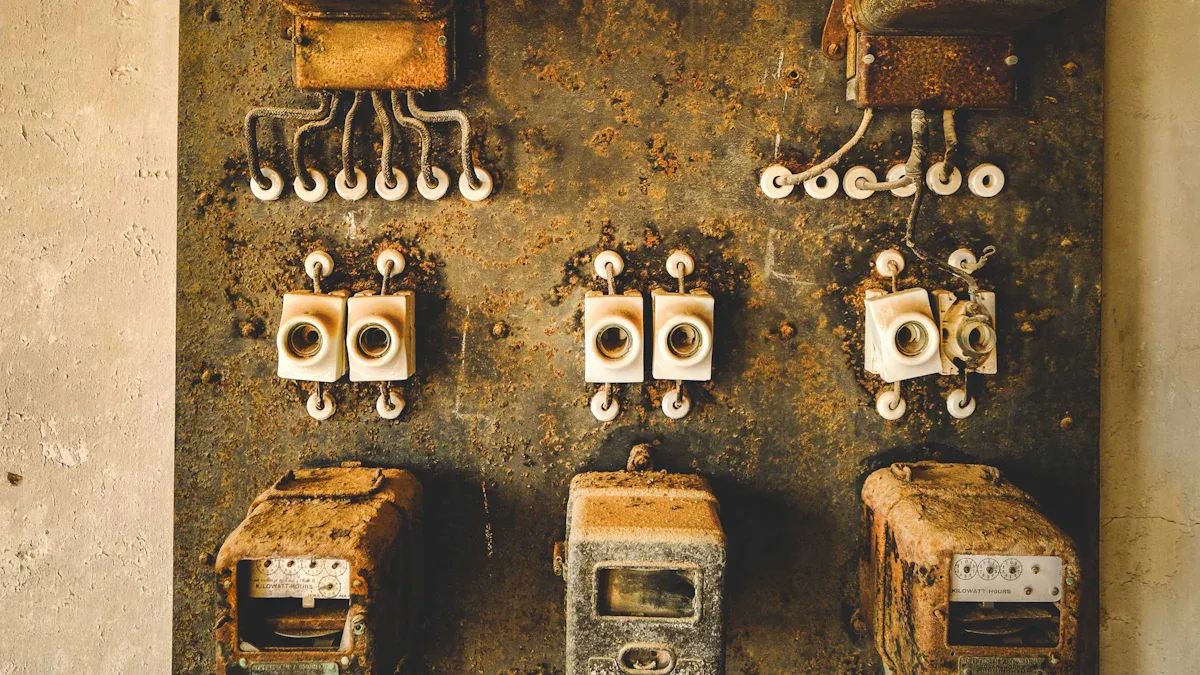When the miniature circuit breaker is burnt out, you lose the main defense against electrical problems. You face a much higher risk of fire or electric shock. Power may stop flowing to parts of your home, leaving lights and outlets dead. If you notice this issue, act fast. Ignoring it puts your safety in danger.
Key Takeaways
- A burnt-out miniature circuit breaker cannot protect your home. It will not stop dangers like fire or electric shock. – You can spot a burnt-out breaker by looking for burn marks. You might also smell something burning. The breaker may trip often or make buzzing sounds. – Breakers burn out when circuits get overloaded. Loose wiring and high heat can also cause this problem. – If you ignore a burnt-out breaker, you risk fires and electric shocks. Your home and appliances can get damaged too. – Always turn off the main power before touching breakers. Call a licensed electrician if you see damage or smell burning.
Burnt-Out MCB Signs
When the miniature circuit breaker is burnt out, you can spot several warning signs. Recognizing these signs helps you act quickly and avoid bigger problems.
Burn Marks and Discoloration
You may notice visible changes on or around your breaker panel. Look for:
- Discoloration or dark spots on the breaker itself
- Charring or fractures on the breaker or nearby panels
- Burn marks or scorch marks near the circuit breaker panel
- Outlets and switches that look melted, discolored, or have char marks
- Wire connections to the breaker that show signs of melting or heat damage
These marks mean heat has damaged the breaker or wiring. If you see any of these, the miniature circuit breaker is burnt out and needs attention.
Burning Smell
A burnt-out breaker often gives off a strong odor. You might smell something sharp, acrid, or chemical-like, similar to burning plastic or wiring insulation. Sometimes, the smell has a metallic hint from copper wiring. The odor can get stronger near the breaker panel and may linger in the air. This burning smell means parts inside the breaker or nearby wires have overheated or melted.
Tip: If you notice a burning smell, turn off the power and check for other signs of damage. Do not ignore this warning.
Frequent Tripping
If your breaker trips more often than usual, this is a clear sign of trouble. Frequent tripping means the breaker cannot handle the electrical load or has internal damage. You may also see scorch marks or melted plastic on the breaker or outlets. These signs show the breaker is no longer working as it should.
Buzzing or Crackling
Listen for unusual sounds coming from your breaker panel. Buzzing, sizzling, or crackling noises suggest loose connections or arcing inside the breaker. These sounds mean electricity is jumping or sparking, which creates heat and can lead to burning smells or even fire. If you hear these noises, the miniature circuit breaker is burnt out or close to failing.
Causes of Burnout
Knowing what causes a miniature circuit breaker to stop working helps you stop bigger problems. Here are the main reasons why burnout happens:
Overloaded Circuits
If you plug in too many things or use big appliances, you can overload the circuit. The breaker will trip to keep your home safe when the current is too high. Inside, a bimetallic strip gets hot and bends, which shuts off the circuit. If you keep overloading it, the breaker gets too hot. This heat can burn out the connections and hurt the breaker.
- Miniature circuit breakers trip if the current is too high.
- Overloads make the bimetallic strip inside get hot and bend, shutting off the circuit.
- Too many overloads cause heat damage and burnt connections.
- Burnt connections and heat damage show the breaker is burnt out from overloads.
- The way the breaker trips shows overloads are a big reason for burnout.
Tip: Do not plug too many things into one outlet. Use different outlets for your appliances to stop overloads.
Faulty Wiring and Loose Connections
Loose wires and bad connections make it hard for electricity to move. This makes heat at the ends of the wires. More resistance means more heat. Sometimes, the heat melts or burns the wire covers. The breaker might not trip because the current is not too high, but the heat can still hurt the breaker and other parts. If you see dark spots or signs of sparks, you may have loose connections. These problems make fire more likely and can make the miniature circuit breaker fail.
Environmental Heat
Hot air around your breaker panel can also cause burnout. When it is hot, the breaker cannot cool down well. Bad airflow or blocked vents make it worse. If the breaker is in a place that is too hot or too cold, the insulation can get weak and the contacts can rust. These things make the breaker wear out faster and make it more likely to fail.
- High air temperature makes it hard for breakers to cool off.
- Bad cooling and blocked airflow make burnout more likely.
- Very hot or cold air can hurt insulation and cause rust.
- Watching the environment and using controls can help stop these problems.
Risks When the Miniature Circuit Breaker Is Burnt Out

If you do not fix a burnt-out miniature circuit breaker, your home is in danger. You lose the safety that keeps you safe from electrical problems. Here are the main dangers you should know about:
Fire Hazard
A burnt-out breaker can cause a fire at home. When the miniature circuit breaker is burnt out, it cannot stop overheating or short circuits. You might see these warning signs:
- Burn marks or melted plastic in the panel
- Rust around the connections, which makes more heat
- The breaker feels warm, even if nothing is on
- You hear crackling, buzzing, or popping from the panel
- There is a strong smell like burning plastic or metal
Note: Electrical problems, like bad breakers, are the second biggest reason for house fires in the United States. Burnt-out panels often happen from using them a lot, old age, or water getting in. If you see or smell burning, call an expert right away.
Electrical Shock
You can get shocked if you touch outlets or switches with a broken breaker. The breaker may not turn off during a problem, so wires can stay live. If you try to reset or change the breaker without turning off the main power, you could get shocked. Kids and pets are in more danger if wires are showing.
Loss of Protection
When the miniature circuit breaker is burnt out, it cannot keep your home safe from overloads or short circuits. This means:
- Appliances and devices can break from sudden power surges.
- Wires can get too hot and melt, which can start fires.
- You lose the main safety guard in your electrical system.
Tip: Do not ignore a burnt-out breaker. Acting fast keeps your home and family safe.
What to Do If the Miniature Circuit Breaker Is Burnt Out
Safety First
You must stay safe if the miniature circuit breaker is burnt out. Electrical panels are risky, even if the power looks off. Many people get hurt doing simple jobs like changing breakers. You can be safer by following important safety rules.
- Always turn off the main power before touching the panel. This stops electricity from moving while you work.
- Use a multimeter to check if any power is left in the panel. Even a little electricity can hurt you.
- Wear PPE like insulated gloves and safety glasses. PPE can help stop most injuries.
- Only use insulated tools made for electrical work. These tools help stop shocks and short circuits.
- Plan your work and use a safety checklist. Lockout/tagout steps make sure no one turns the power back on.
Tip: Never skip safety steps or hurry. NFPA 70E safety rules can stop almost all arc flashes.
Replacement Steps
If you feel ready and have the right tools, you can change a burnt-out breaker. But you should check for other problems first. If the breaker trips a lot, smells burnt, or looks damaged, there may be a bigger problem.
- Turn off the main power to the panel.
- Use a multimeter to check for leftover voltage.
- Look for empty breaker slots if you need to add one.
- Make sure the new breaker matches the circuit’s voltage and amp rating.
- Set the new breaker to OFF before putting it in.
- Take off the panel cover carefully.
- Remove the wires from the old breaker. Clean off any dirt or rust from the wires.
- Connect the wires to the new breaker’s terminals.
- Push the new breaker into the panel until it clicks.
- Put the panel cover back on.
- Turn on the main power, then switch on the new breaker.
- Test the new breaker to see if it works. Label the breaker slot so you know what it is for.
Note: Do not use a breaker with a higher amp rating unless your wires can handle it. A breaker that is too big can cause overheating and fire.
When to Call an Electrician
Sometimes you need a professional. If you see burn marks, smell burning, or hear buzzing, call an electrician fast. These signs mean the problem could be worse than just a bad breaker.
- If the breaker trips a lot or one area loses power, wires may be loose or bad.
- Hot, melted, or discolored wires are very dangerous and need an expert.
- If you want to add new appliances or upgrade your system, an electrician can check if your panel is strong enough.
- Old or worn-out breakers can hide bigger problems in the panel or wiring.
- Flickering lights or changing power levels can mean hidden trouble.
Alert: Waiting to call for help can cause fires, damage, or injury. If you are not sure what to do, stop and call a certified electrician. Doing repairs yourself can break safety rules and void insurance.
Check your panel often and act quickly to stay safe. If the miniature circuit breaker is burnt out, do not ignore it. Acting fast and calling a professional helps protect your family and home.
Preventing Burnout
Regular Inspection
Checking your circuit breakers often helps stop many problems. Regular checks let you find issues before they get bad. When you look at your breaker panel, search for loose wires or color changes. Use a checklist so you do not forget anything.
- Test if the breaker works right and trips on time.
- Check the coil current and how much resistance is in the contacts.
- Look for any slow or bouncy movement in the contacts.
- Make sure the extra contacts work to stop coil burnout.
- Compare your results with factory tests and rules like IEEE C37.09 or IEC 62271-100.
Checking your breakers often helps you find problems early and keeps your home safe.
Avoid Overloads
You can stop burnout by watching how much power you use. Circuit breakers trip if too much power flows, but do not count on this alone.
- Plug your appliances into different outlets and circuits.
- Use surge protectors and power strips that stop overloads.
- Unplug things you are not using to lower the load.
- Watch for signs like lights that flicker or warm outlets.
- Upgrade your wires if you add new appliances or need more power.
If your breaker trips a lot or you smell burning, call a licensed electrician.
Upgrade Old Systems
Old electrical systems can break down and cause trouble. Getting new miniature circuit breakers gives you better safety. New breakers can find faults and shut off power very fast.
- Modern breakers follow strict safety rules and pass many tests.
- Smart breakers can warn you before they fail, so you can fix them early.
- Upgrading helps you avoid repairs and keeps your home safe and up to date.
Upgrading your system keeps your family safe and lowers the chance of fire or shock.
If the miniature circuit breaker is burnt out, you are in danger. Acting fast helps keep your home and family safe.
- Miniature circuit breakers can work for many years. But if there are voltage problems or the wrong size is used, they do not last as long.
- If you smell burning, see smoke, or notice sparks, get help from an expert right away.
- Having an electrician check your system every three years helps stop fires and damage.
Pay attention and move quickly. Taking care of your system and checking it often keeps your home safe.
FAQ
What should you do if your MCB smells burnt?
Turn off the main power right away. Do not touch the breaker. Call a licensed electrician to check the panel. A burnt smell means danger. You must act fast to stay safe.
What happens if you ignore a burnt-out MCB?
You risk fire, electric shock, and damage to your home. The breaker cannot protect you from overloads or short circuits. Ignoring the problem puts everyone in your house at risk.
What does a burnt-out MCB look like?
You may see black marks, melted plastic, or discoloration on the breaker. Sometimes, you notice wires that look burnt or damaged. These signs mean the breaker needs replacement.
What causes an MCB to burn out?
Overloaded circuits, loose wires, and high temperatures can burn out your breaker. Old or faulty breakers also fail more easily. Regular checks help you spot these problems early.
What is the safest way to replace a burnt-out MCB?
Always turn off the main power first. Use insulated tools and wear safety gear. If you feel unsure, call a professional electrician. Never try to replace a breaker with the power on.
The following information may be of interest to you
Signs of damage to the circuit breaker at home
How to Diagnose Micro Circuit Breaker Malfunction in Your Home
What Are the Signs of a Bad Circuit Breaker
What Causes Circuit Breaker Overheating and How to Prevent It
Why Won’t My Circuit Breaker Reset and What Can I Do?



